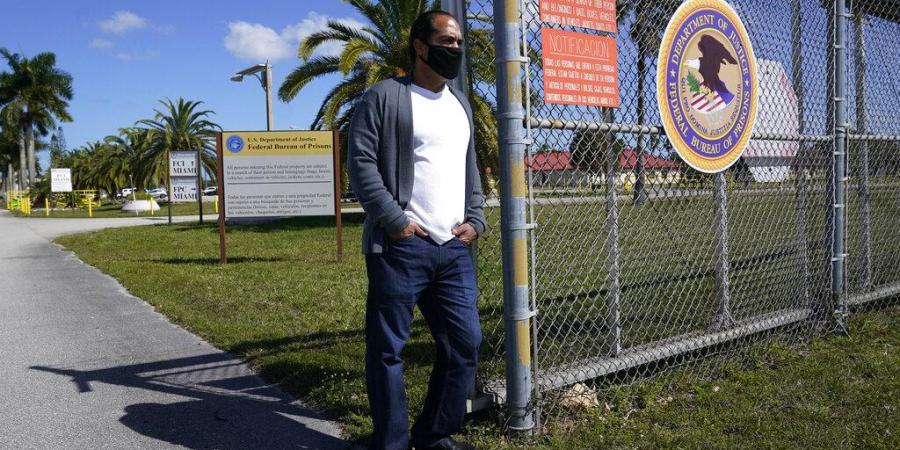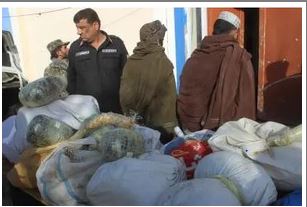 WASHINGTON: A Florida correctional officer polled his colleagues earlier this year in a private Facebook group: “Will you take the COVID-19 vaccine if offered?”
WASHINGTON: A Florida correctional officer polled his colleagues earlier this year in a private Facebook group: “Will you take the COVID-19 vaccine if offered?”
The answer from more than half: “Hell no.” Only 40 of the 475 respondents said yes.
In Massachusetts, more than half the people employed by the Department of Correction declined to be immunized. A statewide survey in California showed that half of all correction employees will wait to be vaccinated. In Rhode Island, prison staff have refused the vaccine at higher rates than the incarcerated, according to medical director Dr. Justin Berk. And in Iowa, early polling among employees showed a little more than half the staff said they’d get vaccinated.
As states have begun COVID-19 inoculations at prisons across the country, corrections employees are refusing vaccines at alarming rates, causing some public health experts to worry about the prospect of controlling the pandemic both inside and outside. Infection rates in prisons are more than three times as high as in the general public. Prison staff helped accelerate outbreaks by refusing to wear masks, downplaying people’s symptoms, and haphazardly enforcing social distancing and hygiene protocols in confined, poorly ventilated spaces ripe for viral spread.
The Marshall Project and The Associated Press spoke with correctional officers and union leaders nationwide, as well as with public health experts and doctors working inside prisons, to understand why officers are declining to be vaccinated, despite being at higher risk of contracting COVID-19. Many employees spoke on the condition of anonymity because they feared they would lose their jobs if they spoke out.
In December and January, at least 37 prison systems began to offer vaccines to their employees, particularly front-line correctional officers and those who work in health care. More than 106,000 prison employees in 29 systems, including the Federal Bureau of Prisons, have received at least one dose of a COVID-19 vaccine, according to data compiled by The Marshall Project and The Associated Press since December. And some states are not tracking employees who get vaccinated in a community setting such as a clinic or pharmacy.
Still, some correctional officers are refusing the vaccine because they fear both short- and long-term side effects of the immunizations. Others have embraced conspiracy theories about the vaccine. Distrust of the prison administration and its handling of the virus has also discouraged officers from being immunized. In some instances, correctional officers said they would rather be fired than be vaccinated.
The resistance to the vaccine is not unique to correctional officers. Health care workers, caretakers in nursing homes and police officers — who have witnessed the worst effects of the pandemic — have declined to be vaccinated at unexpectedly high rates.
The refusal of prison workers to take the vaccine threatens to undermine efforts to control the pandemic both inside and outside of prisons, according to public health experts. Prisons are coronavirus hot spots, so when staff move between the prisons and their home communities after work, they create a pathway for the virus to spread. More than 388,000 incarcerated people and 105,000 staff members have contracted the coronavirus over the last year. In states like Michigan, Kansas and Arizona, that’s meant 1 in 3 staff members have been infected. In Maine, the state with the lowest infection rate, 1 in 20 staff members tested positive for COVID-19. Nationwide, those infections proved fatal for 2,474 prisoners and at least 193 staff members.
“People who work in prisons are an essential part of the equation that will lead to reduced disease and less chance of renewed explosive COVID-19 outbreaks in the future,” said Brie Williams, a correctional health expert at the University of California, San Francisco, or UCSF.
At FCI Miami, a federal prison in Florida, fewer than half the facility’s 240 employees had been fully vaccinated as of March 11, according to Kareen Troitino, the local corrections officer union president. Many of the workers who refused had expressed concerns about the vaccine’s efficacy and side effects, Troitino said.
In January, Troitino and FCI Miami warden Sylvester Jenkins sent an email to employees saying that “in an act of solidarity,” they had agreed to get vaccinated and encouraged staff to do the same. “Even though we recognize and respect that this motion is not mandatory; nevertheless, with the intent of promoting staff safety, we encourage all staff to join us,” the Jan. 27 email said.
Only 25 employees signed up. FCI Miami has had two major coronavirus outbreaks, Troitino said: last July, when more than 400 prisoners out of 852 were suspected of having the disease, and in December, when about 100 people were affected at the facility’s minimum-security camp.
Because so many correctional officers and prisoners haven’t been vaccinated, there are fears that could happen again. “Everybody is on edge,” Troitino said. Though he’s gotten the shot, he’s worried about another outbreak and the impact on already stretched staffing at the prison.
The pandemic has strained prisons already struggling with low staffing rates and subpar health care. Low vaccination rates among officers could push prisons to their breaking point. At the height of the outbreak behind bars, several states had to call in the National Guard to temporarily run the facilities because so many staff members had called out sick or refused to work.

























